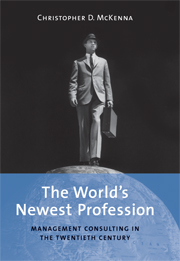Book contents
- Frontmatter
- Contents
- Series Editors' Preface
- Acknowledgments
- Introduction. Making a Career of Consulting
- 1 Economies of Knowledge: A Theory of Management Consulting
- 2 Accounting for a New Profession: Consultants' Struggle for Jurisdictional Power
- 3 How Have Consultants Mattered? The Case of Lukens Steel
- 4 Creating the Contractor State: Consultants in the American Federal Government
- 5 Finding Profit in Nonprofits: The Influence of Consultants on the Third Sector
- 6 The Gilded Age of Consulting: A Snapshot of Consultants Circa 1960
- 7 The American Challenge: Exporting the American Model
- 8 Selling Corporate Culture: Codifying and Commodifying Professionalism
- 9 Watchdogs, Lapdogs, or Retrievers? Liability and the Rebirth of the Management Audit
- Conclusion.The World's Newest Profession?
- Notes
- Index
4 - Creating the Contractor State: Consultants in the American Federal Government
Published online by Cambridge University Press: 18 August 2009
- Frontmatter
- Contents
- Series Editors' Preface
- Acknowledgments
- Introduction. Making a Career of Consulting
- 1 Economies of Knowledge: A Theory of Management Consulting
- 2 Accounting for a New Profession: Consultants' Struggle for Jurisdictional Power
- 3 How Have Consultants Mattered? The Case of Lukens Steel
- 4 Creating the Contractor State: Consultants in the American Federal Government
- 5 Finding Profit in Nonprofits: The Influence of Consultants on the Third Sector
- 6 The Gilded Age of Consulting: A Snapshot of Consultants Circa 1960
- 7 The American Challenge: Exporting the American Model
- 8 Selling Corporate Culture: Codifying and Commodifying Professionalism
- 9 Watchdogs, Lapdogs, or Retrievers? Liability and the Rebirth of the Management Audit
- Conclusion.The World's Newest Profession?
- Notes
- Index
Summary
One of the distinguishing characteristics of the American federal government since 1945 has been its amalgamation of administrative capabilities with professional expertise, a combination that historian Brian Balogh has labeled “the proministrative state.” Federal bureaucrats and independent professionals, although initially wary of one another, united during the postwar era to take on emerging technological and administrative challenges. Government officials in concert with professional experts promoted commercial nuclear power through the Atomic Energy Commission, oversaw advances in medical research through the National Institutes of Health, and worked to stabilize the economy through the Council of Economic Advisors. Balogh has described how these internal experts, however, eventually lost political power in the 1970s as grassroots organizations entered the political fray with their own “independent” experts, challenging the entrenched authority of professionals employed within the bureaucratic agencies of the American state.
This description of the proministrative state is extremely useful, but it overlooks a crucial paradox of the federal government in the postwar era: its remarkable lack of growth during a time of constantly expanding responsibilities. Although the number of state and local government employees in the United States more than tripled from a postwar base of 3.8 million in 1947 to 12 million in 1975, the number of federal civilian employees rose less than 50 percent from 2 million to 2.9 million over the same period.
- Type
- Chapter
- Information
- The World's Newest ProfessionManagement Consulting in the Twentieth Century, pp. 80 - 110Publisher: Cambridge University PressPrint publication year: 2006

